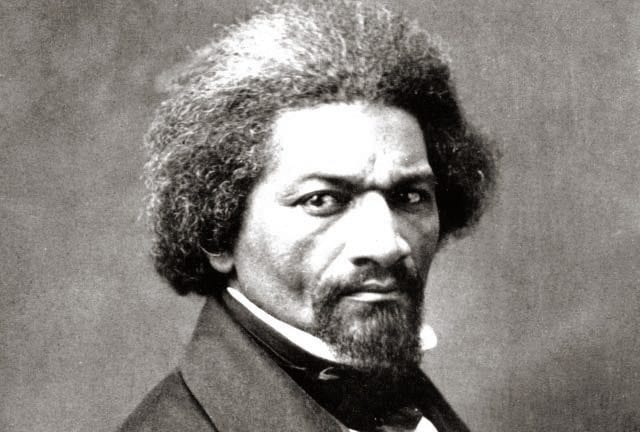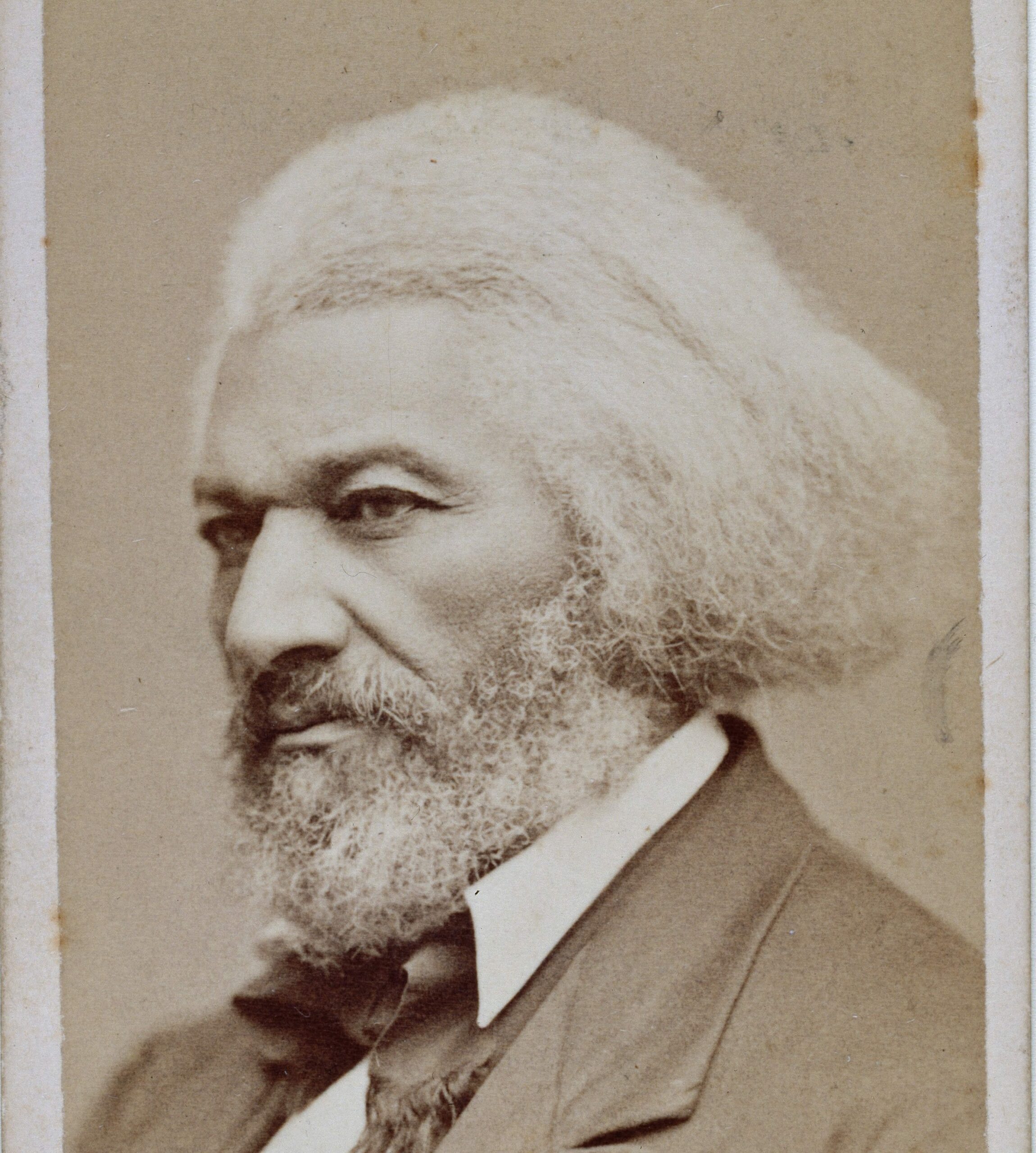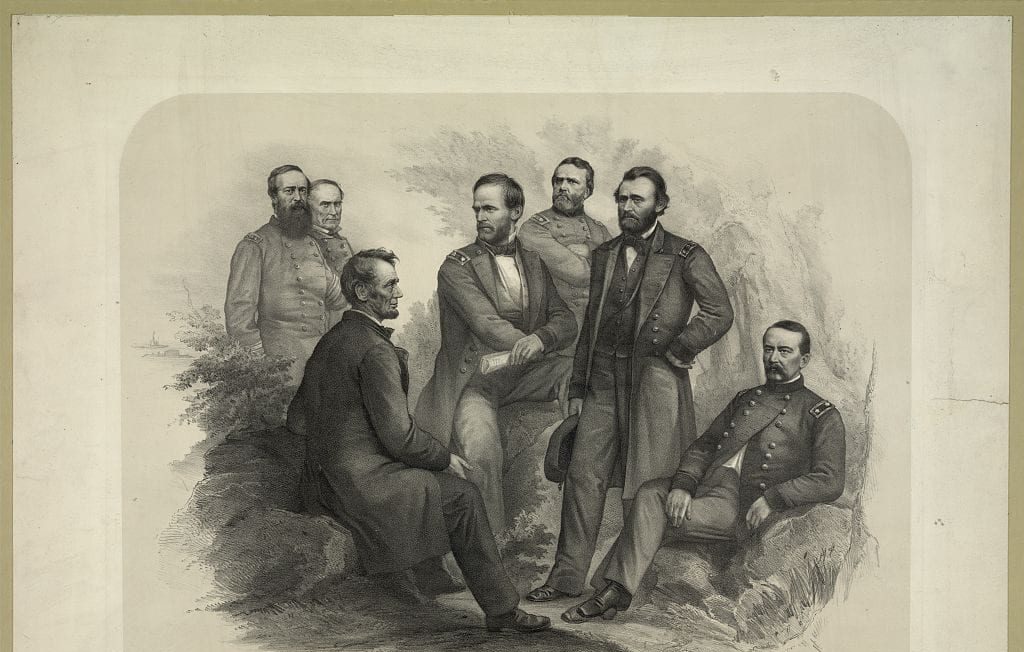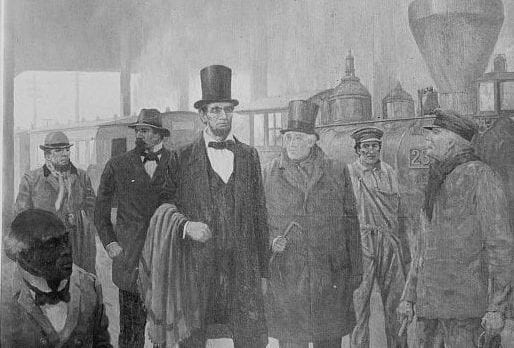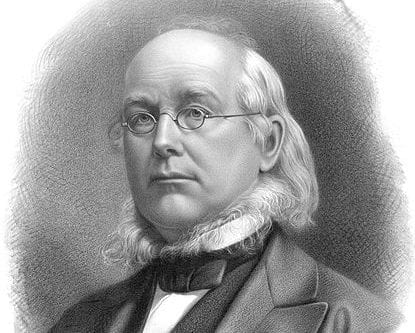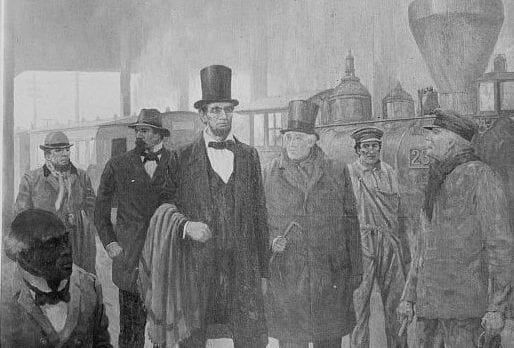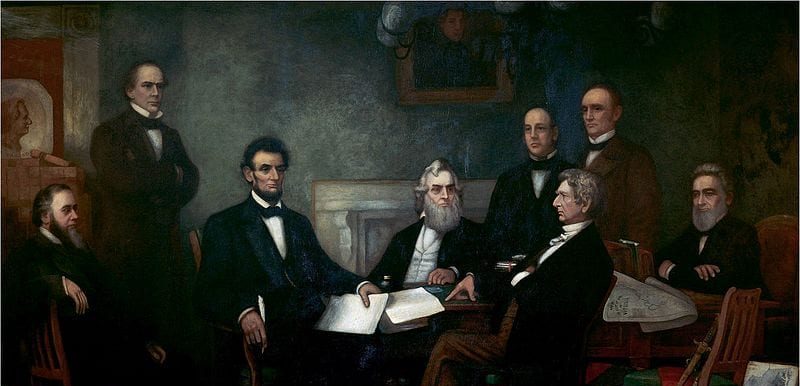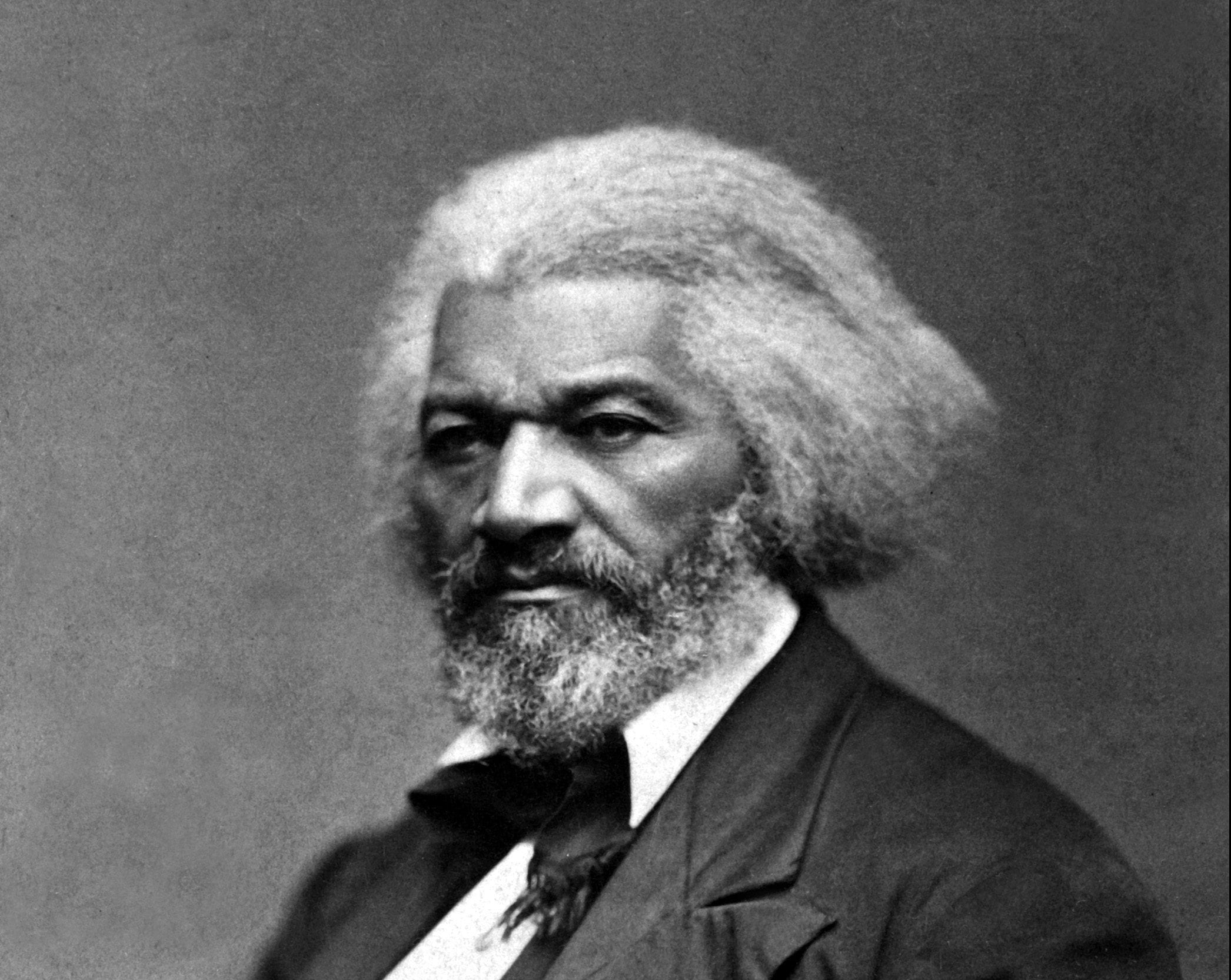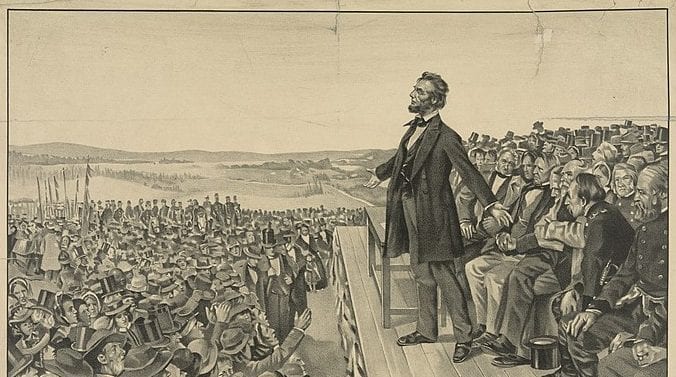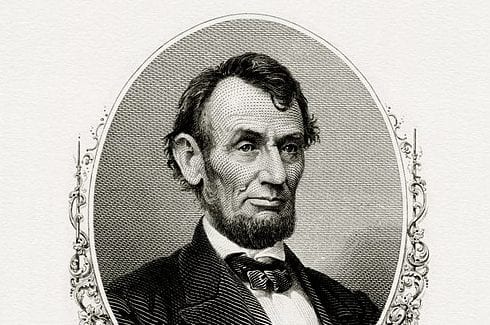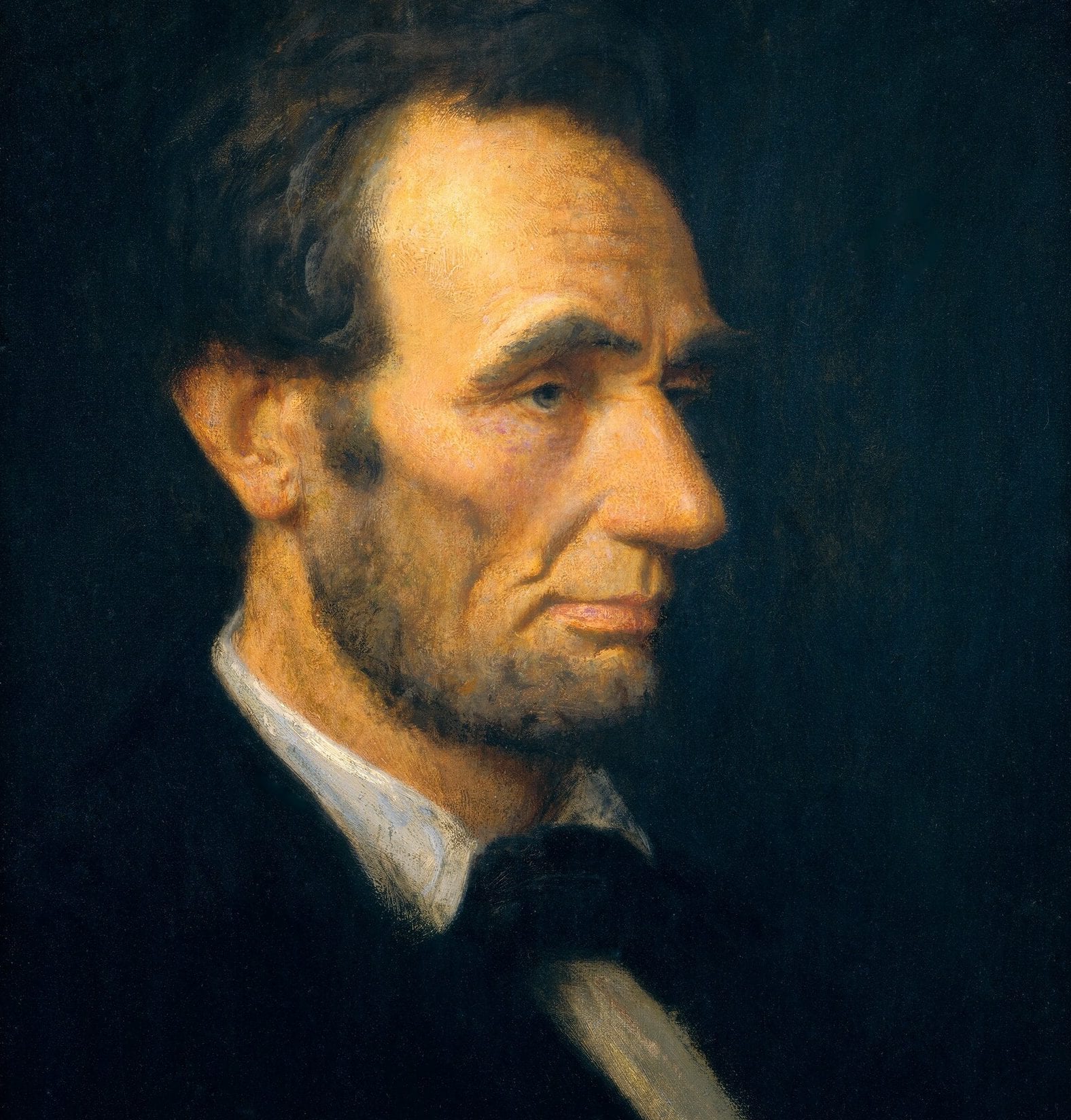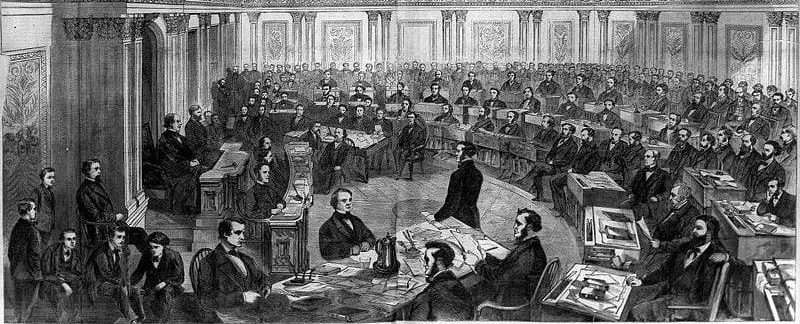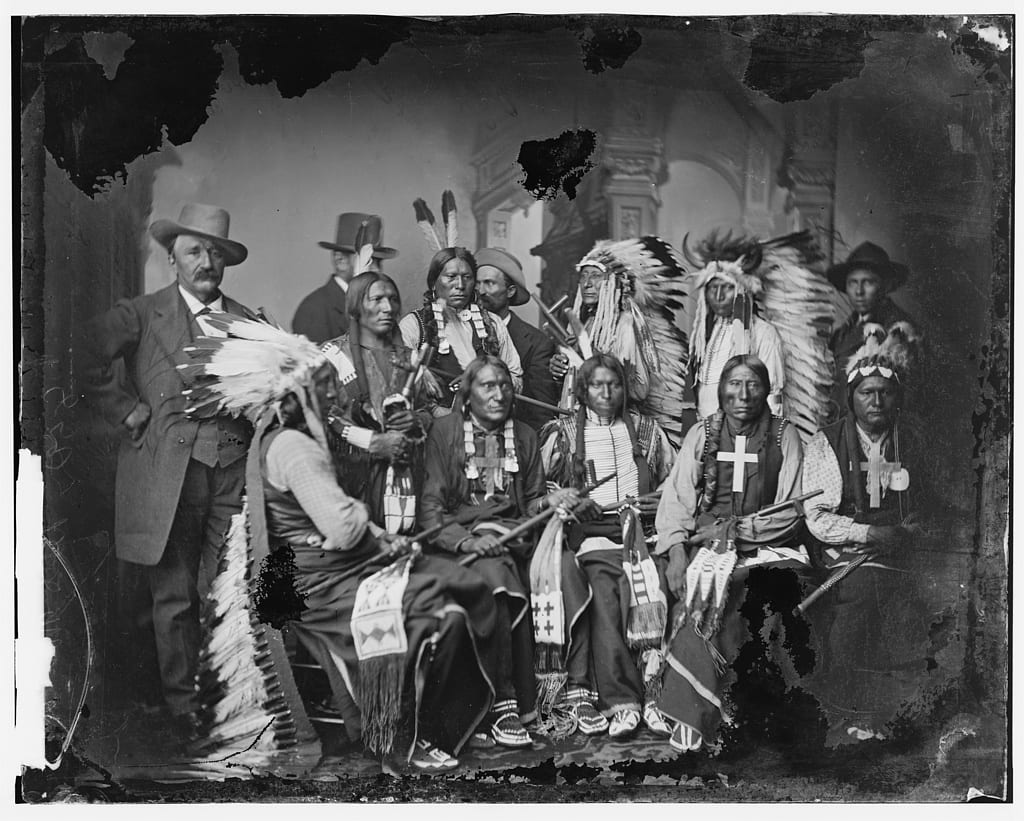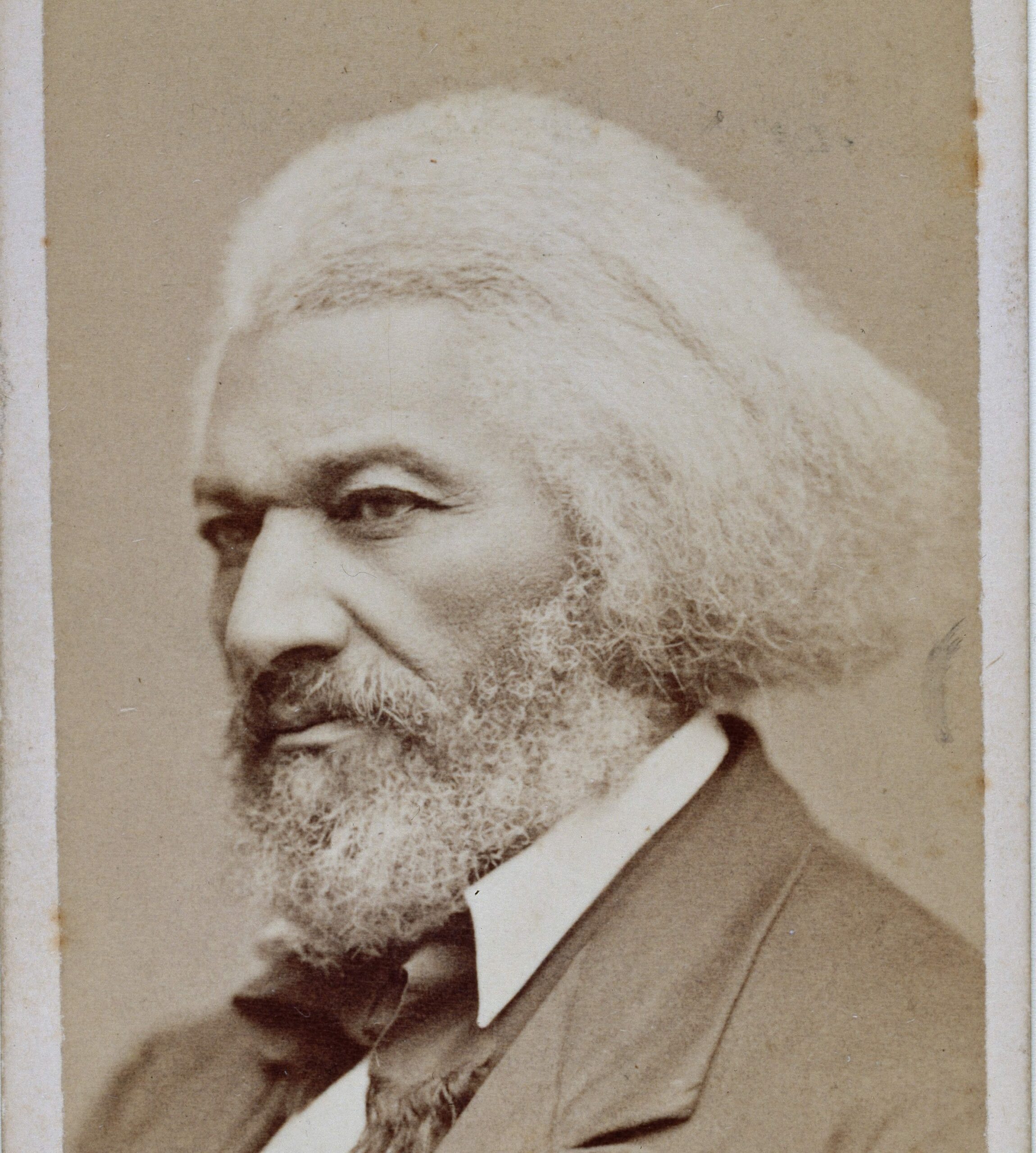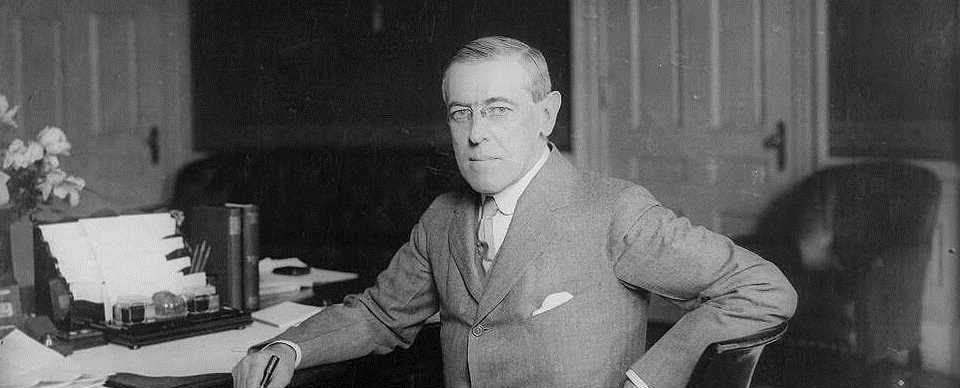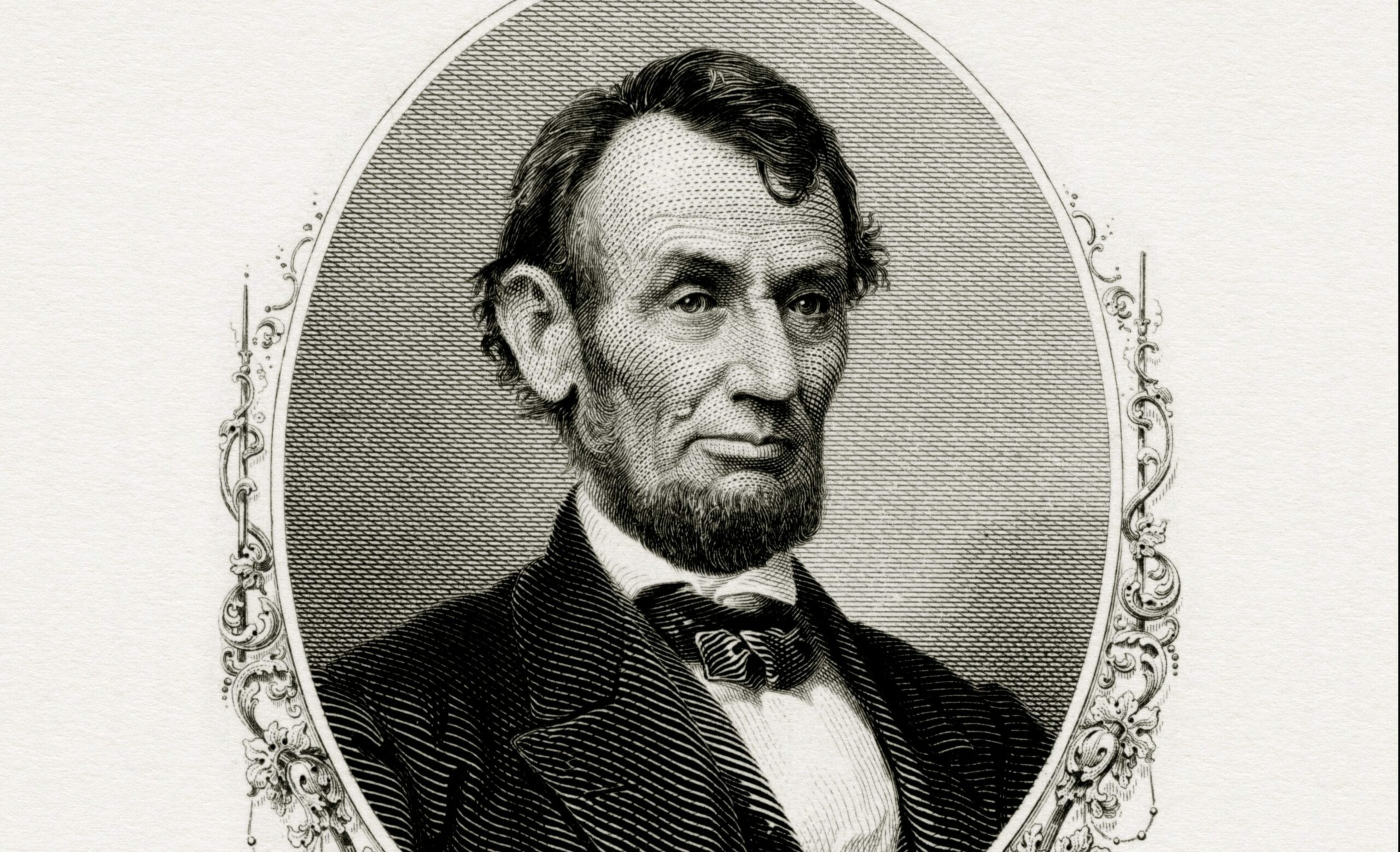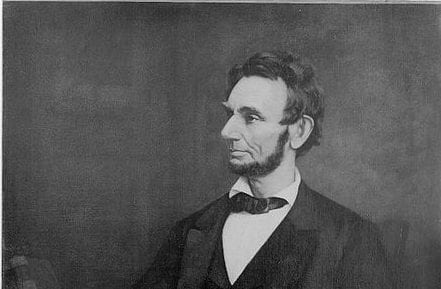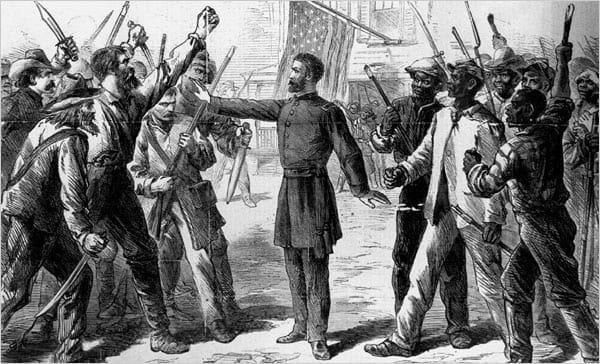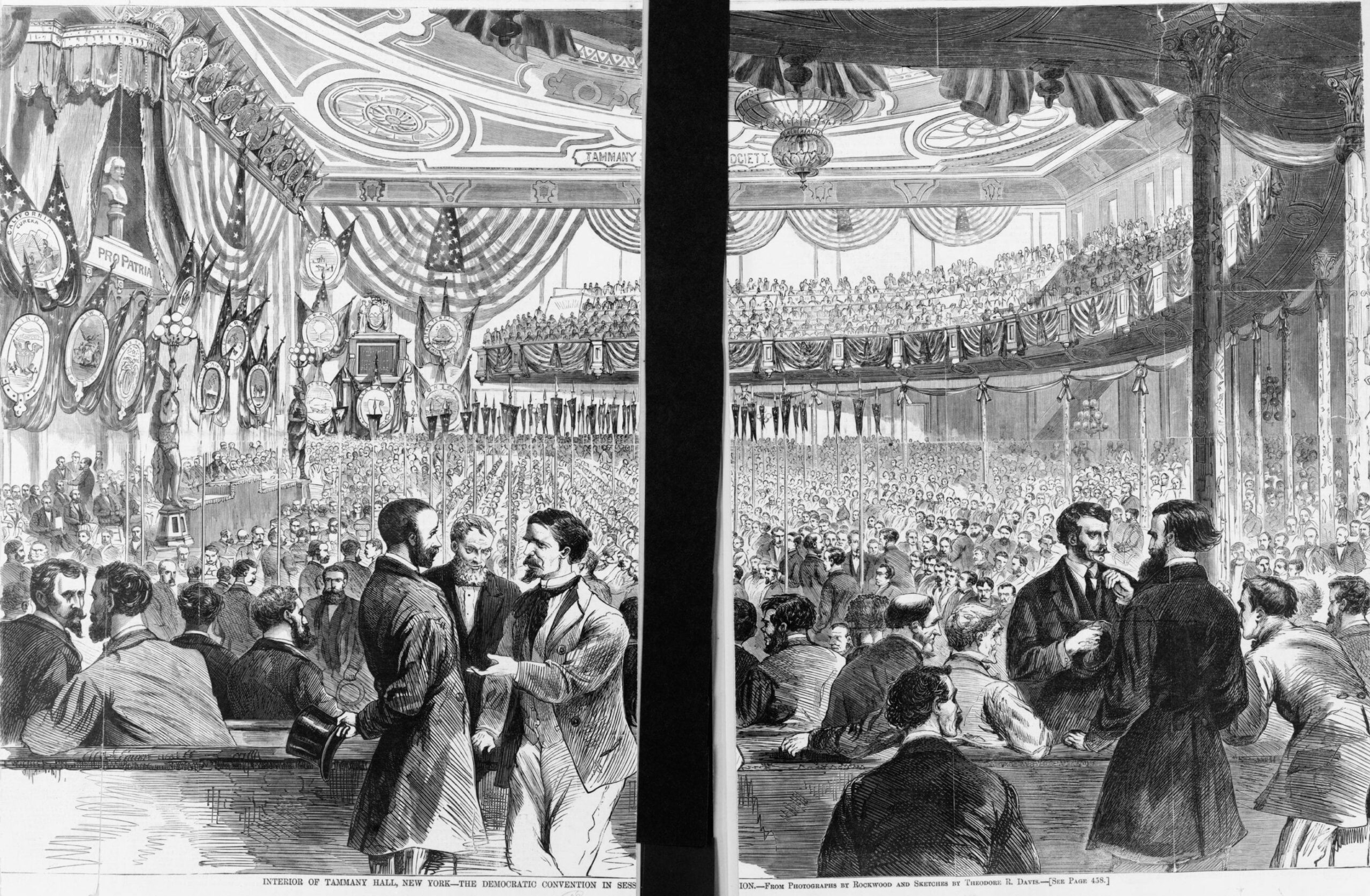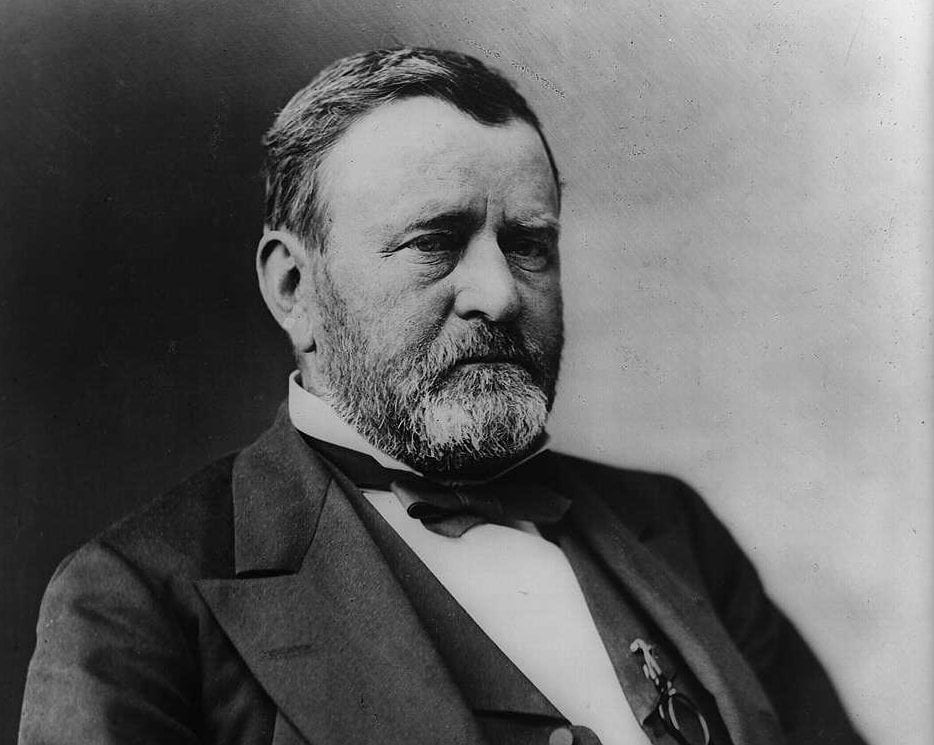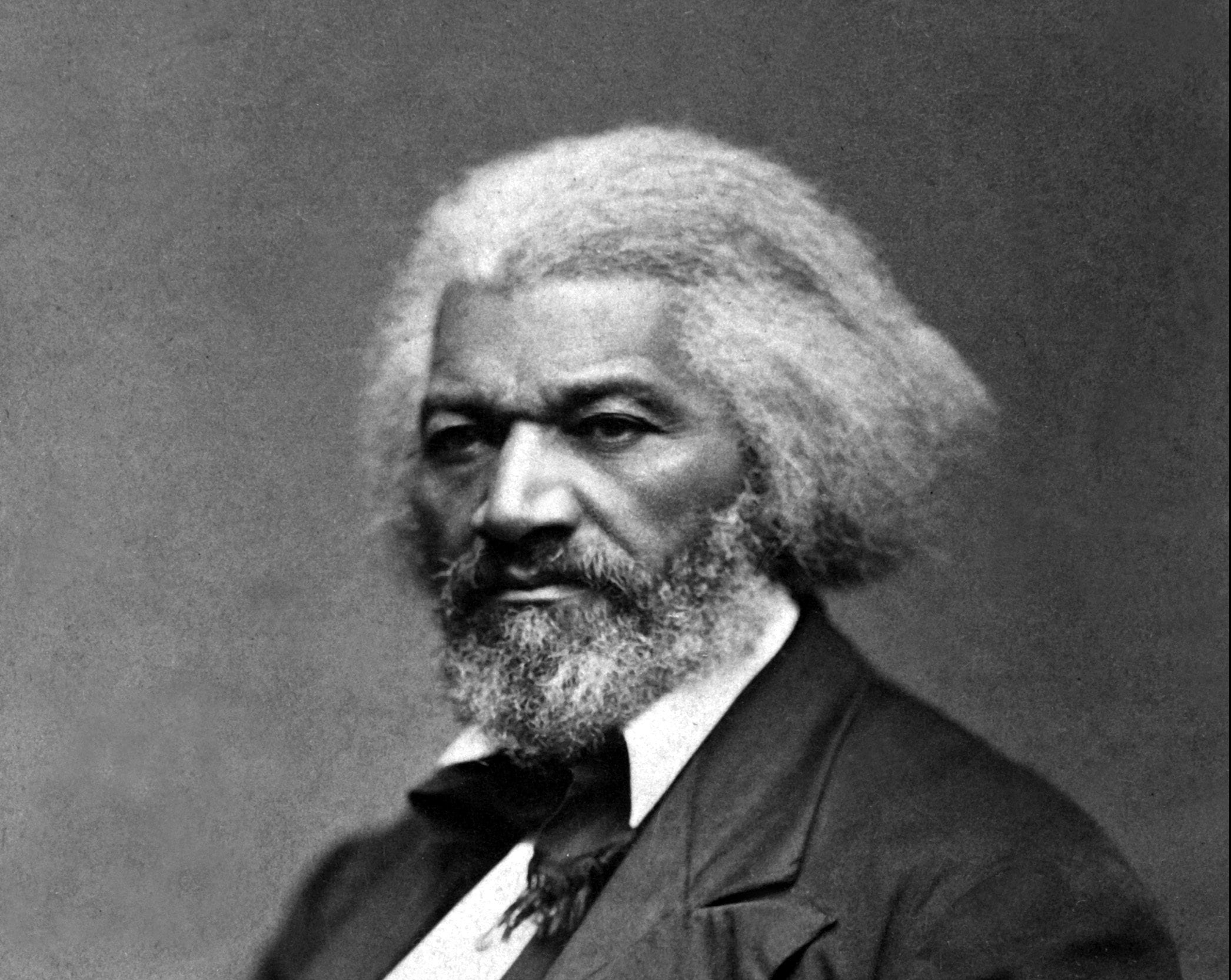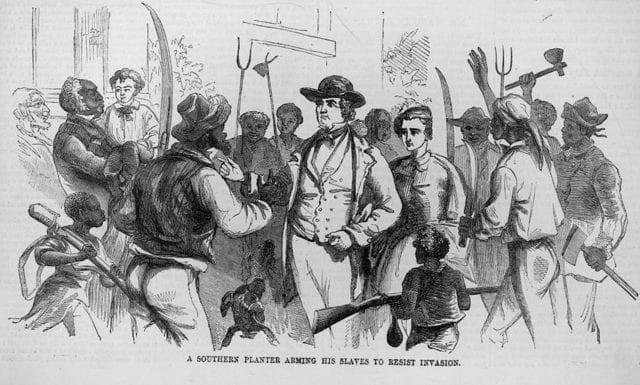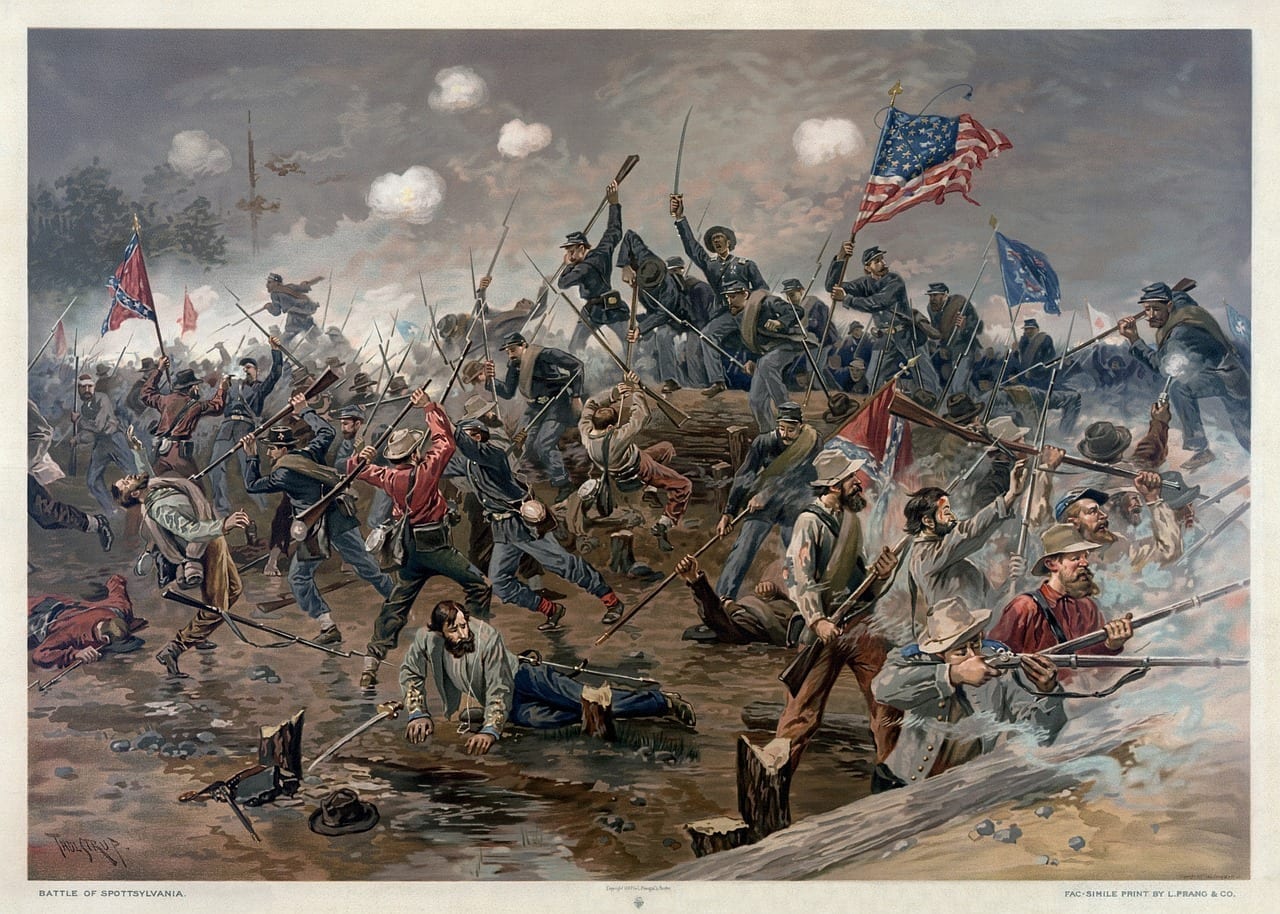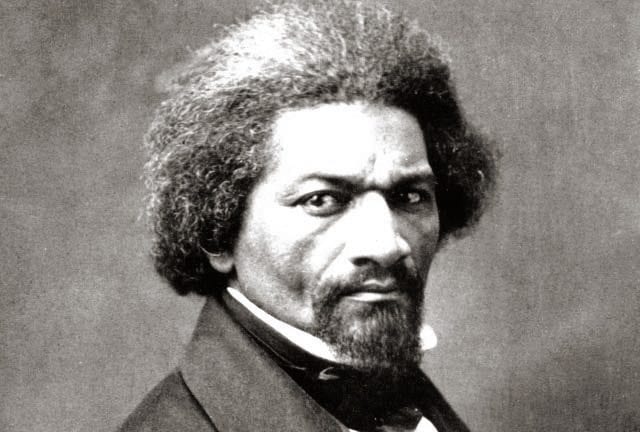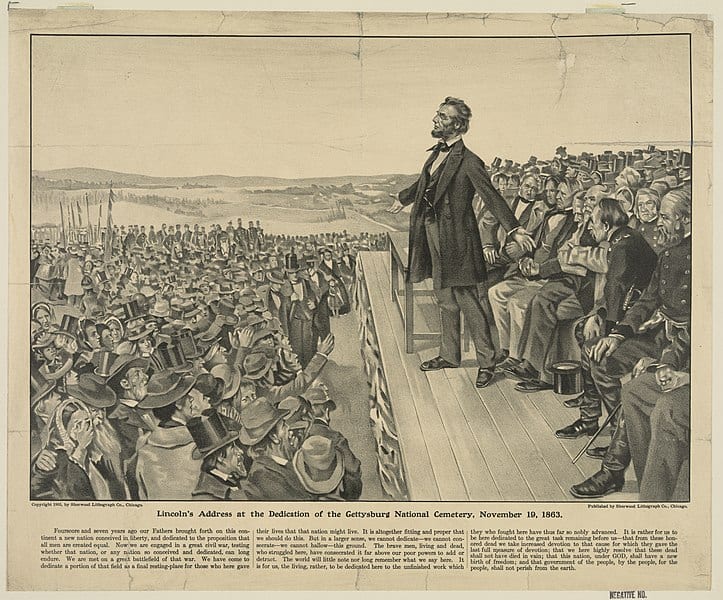


Introduction
By the spring of 1867, Republican frustration with the governments restored under President Johnson’s approach was palpable. Considering these governments illegitimate, both the House and the Senate refused to admit those elected by these restored states to their seats in Congress. Their unwillingness to give Congressional power to those they considered unreformed secessionists was accompanied by alarm at President Johnson’s lax enforcement of the Civil Rights Act passed the year before. The president’s delayed, minimalist enforcement of the law subverted the goals of giving aid to freedmen and protecting the civil rights of freedmen and loyalists in the South. The President seemed to be abetting the effort of the Southern states to restore the social system that prevailed before the war.
The Republicans elected in the landslides of 1864 and 1866 took a new approach. The First Reconstruction Bill (also known as “An Act to Provide More Efficient Government of the Rebel States”) was passed in the waning days of the 39th Congress, and President Johnson could have pocket vetoed it as President Lincoln had pocked vetoed the Wade-Davis Bill. Instead, President Johnson vetoed it and Congress overrode that veto. The 40th Congress began its session on March 4 and in short order passed supplementary Reconstruction Acts empowering the United States military to accomplish additional tasks in the reconstruction of the Southern governments and adding detail to the First Reconstruction Act. These efforts attempted to bypass President Johnson as the one charged with executing the law. President Johnson vetoed both of these bills and both were overridden. This open battle between Johnson and Congressional Republicans marked a new level in executive and legislative conflict over reconstruction.
Portions of all three acts are excerpted below. Together, they constitute an ambitious interventionist approach to reconstruction.
Source: Statutes at Large, 39th Congress, Second Session, March 2, 1867, 428–29, https://goo.gl/Vwb6wM; Statutes at Large, 40th Congress, First Session, 2–4; https://goo.gl/7CXom3; Statutes at Large, 40th Congress, First Session, 14–16, https://goo.gl/4AD1kp.
An Act to Provide for the More Efficient Government of the Rebel States
March 2, 1867
WHEREAS no legal State governments or adequate protection for life or property now exists in the rebel States of Virginia, North Carolina, South Carolina, Georgia, Mississippi, Alabama, Louisiana, Florida, Texas, and Arkansas; and whereas it is necessary that peace and good order should be enforced in said States until loyal and republican State governments can be legally established: Therefore,
Be it enacted by the Senate and House of Representatives of the United States of America in Congress assembled, That said rebel States shall be divided into military districts and made subject to the military authority of the United States. . . .
SEC. 2. And be it further enacted, That it shall be the duty of the President to assign to the command of each of said districts an officer of the army . . . and to detail a sufficient military force to enable such officer to perform his duties and enforce his authority within the district to which he is assigned.
SEC. 3. And be it further enacted, That it shall be the duty of each officer assigned as aforesaid, to protect all persons in their rights of person and property, to suppress insurrection, disorder, and violence, and to punish, or cause to be punished, all disturbers of the public peace and criminals; and to this end he may allow local civil tribunals to take jurisdiction of and to try offenders, or, when in his judgment it may be necessary for the trial of offenders, he shall have power to organize military commissions or tribunals for that purpose, and all interference under color of State authority with the exercise of military authority under this act, shall be null and void.
. . .
SEC. 5. And be it further enacted, That when the people of any one of said rebel States shall have formed a constitution of government in conformity with the Constitution of the United States in all respects, framed by a convention of delegates elected by the male citizens of said State, twenty-one years old and upward, of whatever race, color, or previous condition, who have been resident in said State for one year previous to the day of the election, except such as may be disfranchised for participation in the rebellion or for felony at common law, and when such constitution shall provide that the elective franchise shall be enjoyed by all such persons as have the qualifications herein stated for electors of delegates, and when such constitution shall have been submitted to Congress for examination and approval, and Congress shall have approved the same, and when said State, by a vote of its legislature elected under said constitution, shall have adopted the [14th] amendment . . . and when said article shall have become a part of the Constitution of the United States, said State shall be declared entitled to representation in Congress, and senators and representatives shall be admitted therefrom on their taking the oath prescribed by law, and then and thereafter the preceding sections of this act shall be inoperative in said State. . . .
SEC. 6. And be it further enacted, That, until the people of said rebel States shall be by law admitted to representation in the Congress of the United States, any civil governments which may exist therein shall be deemed provisional only, and in all respects subject to the paramount authority of the United States at any time to abolish, modify, control, or supersede the same. . . .
An Act supplemental to an Act entitled “An Act to provide for the more efficient Government of the Rebel States,” . . . to facilitate Restoration
March 23, 1867
Be it enacted by the Senate and House of Representatives of the United States in Congress assembled, That before . . . September [1, 1867], the commanding general in each district . . . shall cause a registration to be made of male citizens of the United States, twenty-one years of age and upwards, resident in each county or parish in the State or States included in his district, which registration shall include only those persons who are qualified to vote for delegates by the [first Reconstruction act], and who shall have taken and subscribed the following oath or affirmation: “I, ___, do solemnly swear (or affirm), in the presence of Almighty God, that I am a citizen of the State of ___; that I have resided in said State for ___ months next preceding this day, and now reside in the county of ___ or the parish of ___, in said State (as the case may be); that I am twenty-one years old; that I have not been disfranchised for participation in any rebellion or civil war against the United States, nor for felony committed against the laws of any State or of the United States; that I have never been a member of any State legislature, nor held any executive or judicial office in any State and afterwards engaged in insurrection or rebellion against the United States, or given aid or comfort to the enemies thereof; . . . that I will faithfully support the Constitution and obey the laws of the United States, and will, to the best of my ability, encourage others so to do, so help me God”; which oath or affirmation may be administered by any registering officer.
SEC. 2. And be it further enacted, That after the completion of the registration hereby provided for in any State, at such time and places therein as the commanding general shall appoint and direct, of which at least thirty days’ public notice shall be given, an election shall be held of delegates to a convention for the purpose of establishing a constitution and civil government for such State loyal to the Union. . . .
SEC. 3. And be it further enacted, That at said election the registered voters of each State shall vote for or against a convention to form a constitution therefor under this act. . . . The persons appointed to superintend said election, and to make return of the votes given thereat, as herein provided, shall count and make return of the votes given for and against a convention; and the commanding general to whom the same shall have been returned shall ascertain and declare the total vote in each State for and against a convention. If a majority of the votes given on that question shall be for a convention, then such convention shall be held as hereinafter provided; but if a majority of said votes shall be against a convention, then no such convention shall be held under this act. . . .
SEC. 4. And be it further enacted, That the commanding general of each district shall appoint as many boards of registration as may be necessary, consisting of three loyal officers or persons, to make and complete the registration, superintend the election, and make return to him of the votes, list of voters, and of the persons elected as delegates by a plurality of the votes cast at said election; and upon receiving said returns he shall open the same, ascertain the persons elected as delegates according to the returns of the officers who conducted said election, and make proclamation thereof; and if a majority of the votes given on that question shall be for a convention, the commanding general, within sixty days from the date of election, shall notify the delegates to assemble in convention, . . . and said convention, when organized, shall proceed to frame a constitution and civil government according to the provisions of this act, and the act to which it is supplementary; and when the same shall have been so framed, said constitution shall be submitted by the convention for ratification to the persons registered under the provisions of this act at an election to be conducted by the officers or persons appointed or to be appointed by the commanding general . . . and to be held after the expiration of thirty days from the date of notice thereof, to be given by said convention; and the returns thereof shall be made to the commanding general of the district.
SEC. 5. And be it further enacted, That if, according to said returns, the constitution shall be ratified by a majority of the votes of the registered electors qualified . . . , the president of the convention shall transmit a copy of the same duly certified to the President of the United States, who shall forthwith transmit the same to Congress . . . ; and if it shall moreover appear to Congress that the election was one at which all the registered and qualified electors in the State had an opportunity to vote freely and without restraint, fear, or the influence of fraud, and if the Congress shall be satisfied that such constitution meets the approval of a majority of all the qualified electors in the State, and if the said constitution shall be declared by Congress to be in conformity with the provisions of the act . . . , and the said constitution shall be approved by Congress, the State shall be declared entitled to representation, and senators and representatives shall be admitted therefrom. . . .
An Act supplementary to an Act entitled “An Act to provide for the more efficient Government of the Rebel States,” passed on [March 2, 1867], and the Act supplementary thereto, passed on [March 23, 1867]
July 19, 1867
Be it enacted by the Senate and House of Representatives of the United States of America in Congress assembled, That it is hereby declared to have been the true intent and meaning of the act[s] of [March 2, 1867] and [March 23, 1867], that the governments then existing in the rebel States of Virginia, North Carolina, South Carolina, Georgia, Mississippi, Alabama, Louisiana, Florida, Texas, and Arkansas were not legal State governments. . . .
SEC. 2. And be it further enacted, That the commander of any district named in said act shall have power, subject to the disapproval of the General of the army of the United States . . . to suspend or remove from office . . . any officer or person holding or exercising . . . any civil or military office or duty in such district under any power, election, appointment or authority derived from, or granted by, or claimed under, any so-called State or the government thereof, or any municipal or other division thereof. . . .
SEC. 3. And be it further enacted, That the General of the army of the United States shall be invested with all the powers of suspension, removal, appointment, and detail granted in the preceding section to district commanders.
. . .
SEC. 5. And be it further enacted, That the boards of registration provided for in the [earlier acts] shall have power, and it shall be their duty before allowing the registration of any person, to ascertain, upon such facts or information as they can obtain, whether such person is entitled to be registered under said act, and the oath required by said act shall not be conclusive on such question, and no person shall be registered unless such board shall decide that he is entitled thereto; and such board shall also have power to examine, under oath . . . any one touching the qualification of any person claiming registration; but in every case of refusal by the board to register an applicant . . . the board shall make a note or memorandum . . . setting forth the grounds of such refusal or such striking from the list. . . .
. . .
SEC. 11. And be it further enacted, That all the provisions of [these acts] . . . shall be construed liberally, to the end that all the intents thereof may be fully and perfectly carried out.
Tenure Of Office Act
March 02, 1867
Conversation-based seminars for collegial PD, one-day and multi-day seminars, graduate credit seminars (MA degree), online and in-person.


